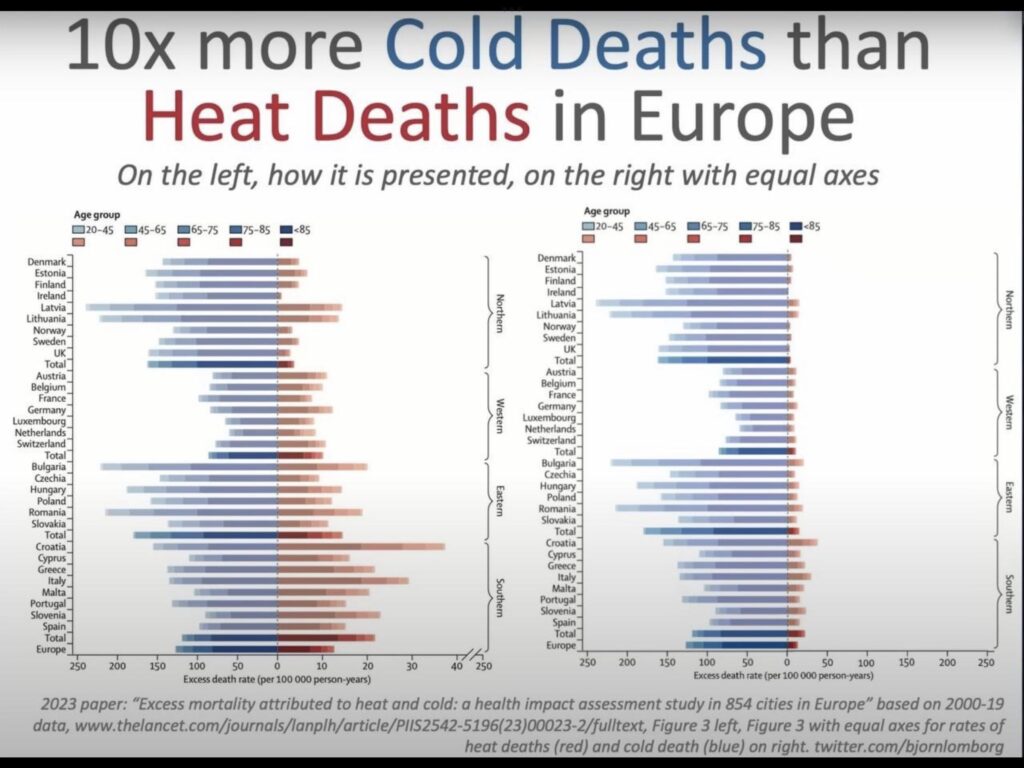The Lancet published the chart on left with a different X-Axis to downplay fact that cold causes ten times more deaths than heat in Europe. Björn Lomborg corrected that with the chart on right.

|
|||||
|
The Lancet published the chart on left with a different X-Axis to downplay fact that cold causes ten times more deaths than heat in Europe. Björn Lomborg corrected that with the chart on right.  I haven’t trusted a word the BBC says about much for several decades, but I do remember a time when at least weather reports could be taken at face value. Now I don’t even know if they are lying about that. Turns out many of the breathless inferno weather reports from southern Europe were being drastically overstated, sometimes by as much as 10 degrees! Make no mistake, the “nudge unit” is at work, spreading its statist bullshit far and wide. Not even Jeremy Corbyn, the most odious public figure in Britain since Oswald Mosley, should be de-banked due to political views. Banking is a highly regulated state protected cartel, they should no more be allowed to do this than to de-bank people for being Jews or Black. If what was done to Farage (and even people simply related to him) is allowed to stand, that’s it, we are now in China territory, an actual full-blown tyranny. Today Moscow repeats its crime by invading Ukraine, by denying the existence of a Ukrainian nation. Think also of Russia’s accomplices in the West — those monstrous liars and accessories after the fact, who say that Ukraine and NATO are responsible for the war in Ukraine, or say that we must (for our own sake) allow the Ukrainian people to be butchered and oppressed again. It was shameful enough that the world stood by and believed the lies and tolerated Stalin’s genocide against Ukraine. But now, today, it unfolds again! And the dictator in Moscow finds no shortage of apologists and helpers in the West. They misrepresent those, like myself, who think Ukraine should be assisted, by calling us warmongers — as if we are advocating war with Russia. But there is no such advocacy. Ukrainians are already fighting because they have been invaded. It is their war, not ours. But we do have a moral obligation to help them. Furthermore, the evil they are fighting also wants to destroy us. In an open letter, 68 security and privacy researchers warned the draft legislation will profoundly undermine the essential security used to keep digital communications secure.
Free speech and privacy are under attack worldwide and particularly in the UK. One naturally wants to believe that an issue one is involved in is of world-historical importance. But as the judge himself wrote in the decision, “If the allegations made by Plaintiffs are true, the present case arguably involves the most massive attack against free speech in United States’ history.” That, my friends, is a strong claim, but as I have previously argued, an entirely accurate one. Lockdown ruined Britain – and our deluded leaders couldn’t care less. It was a catastrophic error: we should have pursued a liberal Swedish or Floridian approach. Lockdowns saved or extended comparatively few lives but inflicted huge economic, social, health and psychological damage, left behind a ticking cancer time bomb and caused or exacerbated most of the pathologies of contemporary Britain. Yet there is something very wrong with our national conversation: why are we so reluctant to accept our mistakes, to connect the dots, to link lockdowns with Broken Britain? How is Matt Hancock able, with a straight face, to tell the Covid Inquiry that Britain must prepare for wider, earlier and more stringent lockdowns in the face of future pandemics? The delusion is staggering, the hypocrisy sickening, the mendacity breath-taking. Literary critic Cyril Connolly said that the war between the generations is the only war in which everyone changes sides eventually. He was wrong. Politics is war, of course; and the Conservative Party switched en masse years ago. Unencumbered by any meaningful philosophy, they just marched from right to left. Theresa May sounds for all the world like a Labour back-bencher buttering up the party big guns. It’s difficult listening. That said, I fully understand her desire to put the boot in. Who wouldn’t? The death of the Tories is not a tragedy in and of itself. The carcass can rot for all I care. It’s what they haven’t done. What they failed to deliver. And all the fucking about. One thing they did manage to do? Create a hell-ish environment in the institutions. Everything is in place. Labour will REALLY be able to wreak their identitarian havoc. Just wait and see. We’ll probably be asked to express our gender preferences through the medium of interpretive dance. And that’ll be the sensible option. Seriously though – they’ll finish their revolution. And with it, the country. Nobody will be able to do a damn thing about it. But grinding poverty is, so far as ministers are concerned, a price worth paying for the cult of net zero. Few independent experts pretend that either solar power or wind power are remotely adequate for the needs of heating and powering a country of approaching 70 million people. We are facing this serious crisis because of the demented opposition to nuclear power that has taken root in the last 20 years – a bacillus that entered the Conservative Party’s bloodstream with the leadership of Dave Cameron – and a chronic determination to make promises about improving our environmental record that would undermine the economy of any advanced country that relies on the generation of electricity, the heating of buildings and water and, of course, on moving people and goods around from A to B. |
|||||

All content on this website (including text, photographs, audio files, and any other original works), unless otherwise noted, is licensed under a Creative Commons License. |
|||||